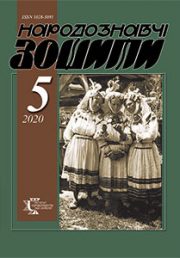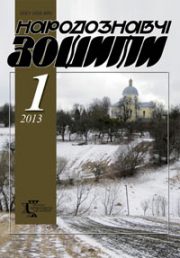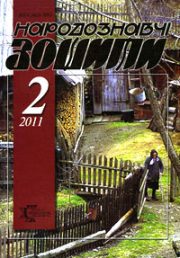The Ethnology Notebooks. 2019, № 5 (149), 1056—1067
UDK 37.091.011.3:94-051
DOI https://doi.org/10.15407/nz2019.05.1056
DIFFICULT FATES OF MY FAMILY IN THE 20TH CENTURY: HISTORICAL AND FOLK DOCUMENTATION
SOKIL Vasyl
ORCID ID: http://orcid.org/0000-0003-3164-1217
Doctor of Philology, Professor, Head of Department
The Ethnology Institute National Academy of Sciences of Ukraine
Department of Folklore,
15 Svobody ave., 79000, Lviv, Ukraine
e-mail: vasylsokil@gmail.com
Abstract. The paper describes the author’s family that in 1940—50s suffered a lot of abuses, murders because its national position in the political and everyday life, in armed struggle against the occupants who seized the territory of Ukraine and desecrated its faith, rituals and traditions.
The author reports the aspects of life of almost every family in the Western Ukraine in that difficult historical period which have been unknown to the academic community.
The subject of the research is the biography (in the broad sense of this word) of one large family in the specified period of time. This implies the purpose of the proposed historical and folkloric research — to describe circumstances in which the Ukrainians were forced to live, work and struggle for the national identity, to show the forms of opposition against occupants and the most important — to retain hope for the future despite of all difficulties or losses (material, human, etc). Therefore, the chosen topic remains very relevant.
The paper was written on the basis of the register of births, marriages, and deaths of the village of Volosianka at the beginning of the 19th — in first half of the 20th century, as well as the documents on the awareness campaign in this settlement in 1930s. Important sources were represented by the records of folk prose from various respondens — direct witnesses or listeners (non-witnesses) of the events.
The paper provides insight into the awareness movement in the village until 1939 and its decay after the advent of the Soviet occupants, describes mass persecutions of people, arrests, etc. Especially cynical were forced deportations of whole families, even whole villages, to Siberia where they endured extreme sufferings: they were freezing on cold, lived in barracks, starved. However, people still had a tiny hope to survive in these difficult circumstances and to return home. But for many of them this road was closed. Participants or sympathizers of the national liberation movement were cruelly punished or murdered. Women, together with their husbands, struggled against the apparatus of the Ministry for State Security (MGB), consciously risking their lives and even the lives of their small children. All of them believed in the idea of the independent Ukraine, struggled for it and were even ready to sacrifice their lives for the sake of freedom.
Folklore records are authentic and preserve all nuances of the Boykos dialect — phonetic, morphological and syntactic ones. A differential peculiarity of the local vernacular is preservation of the guttural sound «ы».
Keywords: awareness campaign, Ukrainian Insurgent Army (UPA), struggle, Syberia, death, return home.
Received 28.10.2019
REFERENCES
Metric book from the village Volosyanka (beginning of XIX – mid XX century). Parohialnyy archive in Volosyanka village. 330 pages.[in Ukrainian].
Requests of the inhabitants of the village Volosyanka for permission to establish reading rooms and reports on its activities. In Tsentral’nyy derzhavnyy istorychnyy arkhiv u L’vovi. F. 348. Op. 1. Od. zb. 1645. Ark. 14—18 [in Ukrainian].






